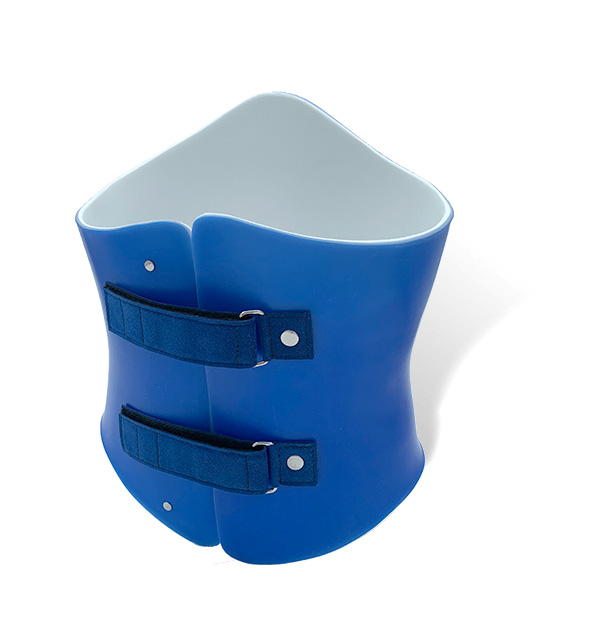Spondylolysis is also known as a ‘pars defect’ or ‘pars fracture’. It is a stress fracture through the pars interarticularis, a segment of the vertebra which connects the facet joints of the spine.
Located on either side of the vertebra, a stress fracture can happen on one side (unilateral) or both sides (bilateral). The most common area of the spine it affects is the lumbar (lower) spine, specifically L5.
These stress fractures usually occur during childhood or adolescence and are common in young athletes. It is most often caused by repetitive load and stress, rather than an acute event.
Although often asymptomatic, it can cause significant lower back pain. In some cases, the stress fracture weakens the bone causing the vertebra to displace and slip out of position. This condition is called spondylolisthesis.

Bespoke Pars fracture spinal brace
Historically, conservative treatment has focused on rest and withdrawal from exercise. At LOC, we offer a non-surgical conservative option of a spinal brace.
The aim of this bespoke spinal brace is to:
After the initial appointment, one of our specialist clinicians will take the necessary scans and measurements. A bespoke brace will be modelled and manufactured in-house.
It will then be fitted by one of our specialist clinicians. Typically, these braces are used alongside rest for a period of 3 or 6 months (time scales will be directed by your consultant).
We have been treating pars fractures conservatively for 3 years and our union rates are above average, which is extremely positive in this patient group. This data is currently under further analysis via medics and shall be available in the early stages of next year.
Please use the form on this page to book an appointment with one of our specialist clinicians.

Sofia no longer needs surgery to correct her scoliosis following successful bracing treatment with the LOC scoliosis brace.

Oliver started noticing significant improvements in his pectus excavatum after just 6 months of vacuum bell therapy treatment.

Understanding how to spot the signs and symptoms of scoliosis can help parents detect the condition earlier. This leads to better treatment outcomes for scoliosis patients and can reduce the need for spinal surgery later in life.

Flo’s growth spurt caused her small scoliosis curve to become much bigger in a short space of time before seeking bracing treatment at LOC.